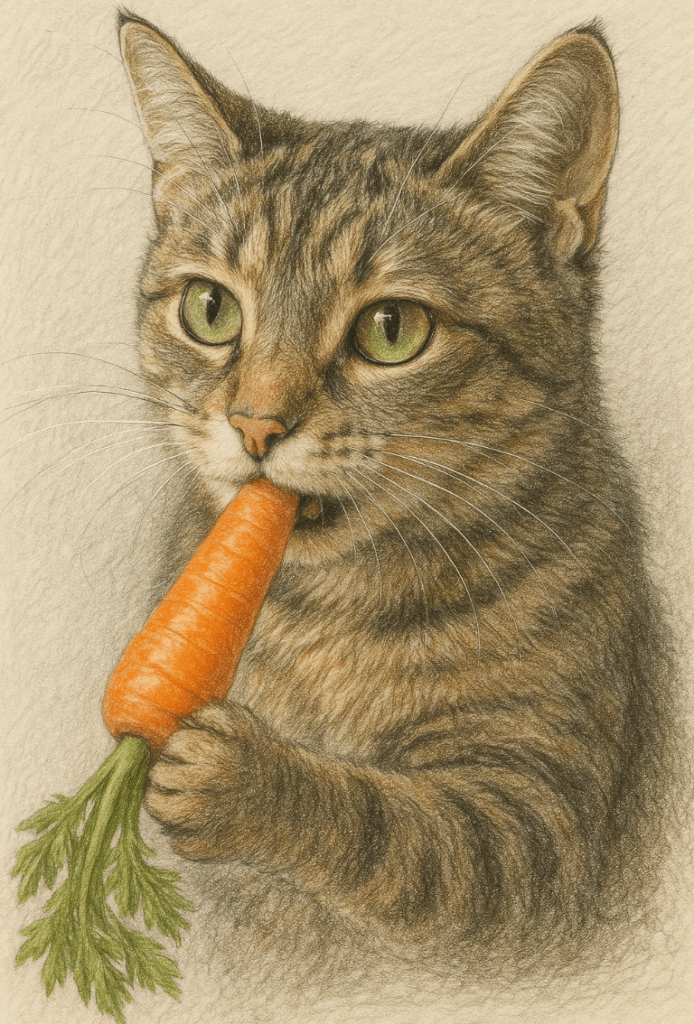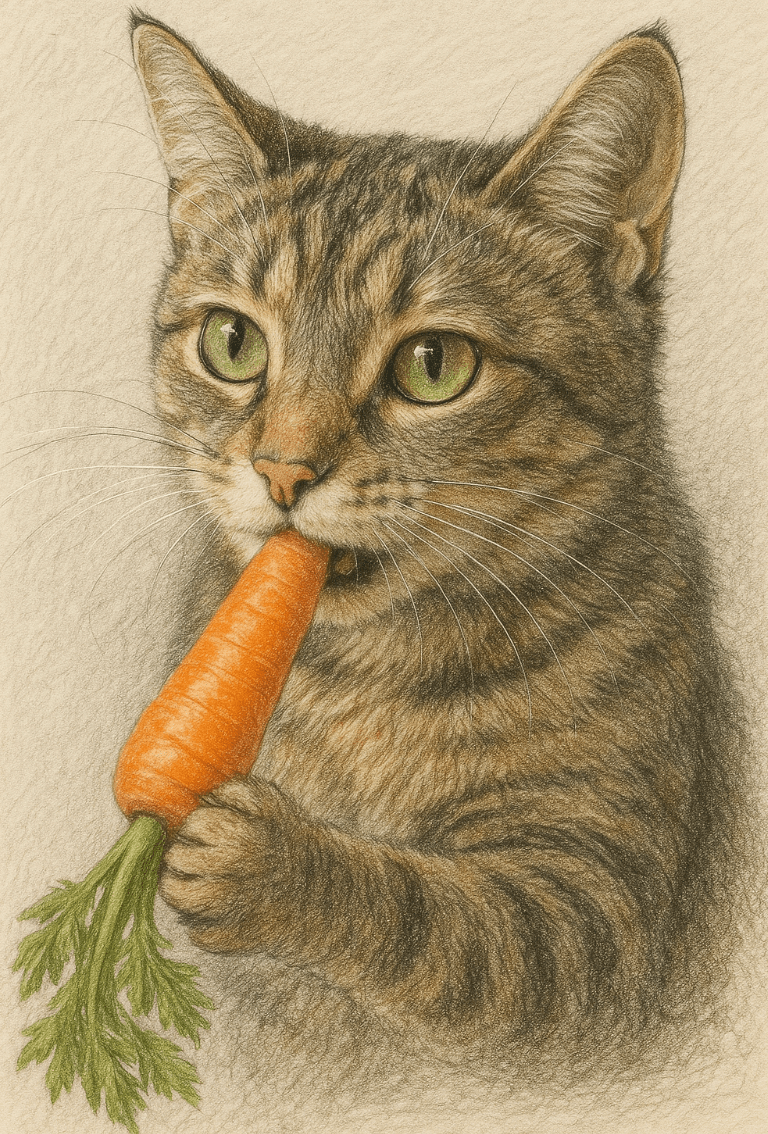Can Cats Eat Carrots?
Cats are obligate carnivores, meaning their diet primarily consists of meat. However, many cat owners wonder whether vegetables like carrots can be safely included in their feline friend’s diet. While cats don’t have a natural craving for veggies, some plant-based foods can offer nutritional benefits when introduced carefully. Carrots, in particular, are rich in vitamins and antioxidants that humans enjoy—but are they safe or beneficial for cats? In this blog post, we’ll explore whether cats can eat carrots, how to prepare them safely, and what precautions you should take to ensure your cat’s health and happiness.
Health Benefits of Feeding Carrots to Cats (in Moderation)
While cats don’t require vegetables in their diet, carrots can provide some surprising health benefits when offered in small amounts. Here’s why incorporating carrots into your cat’s occasional snack routine might be worth considering.
Rich in Vitamins:
Carrots contain vitamin A, which supports eye health, skin condition, and immune function—though cats convert it less efficiently than humans.Low in Calories:
As a low-calorie treat, carrots can help maintain a healthy weight without adding unnecessary fats or sugars.High in Fiber:
The fiber in carrots can aid digestion, especially if your cat struggles with constipation or hairballs.Antioxidant Properties:
Antioxidants in carrots help combat free radicals, potentially reducing inflammation and supporting overall wellness.Hydration Boost:
Raw carrots have a high water content, which can contribute to your cat’s daily fluid intake, especially if they’re not big drinkers.
While these benefits exist, carrots should only be given as an occasional treat and never as a dietary staple.
Potential Risks of Feeding Carrots to Cats
Although carrots are generally safe for cats, there are risks associated with improper preparation or overfeeding. Understanding these hazards will help you make informed decisions about including carrots in your cat’s diet.
Choking Hazards:
Whole or large chunks of raw carrot pose a choking risk, particularly for smaller cats or kittens.Digestive Upset:
Excessive fiber from too many carrots can lead to diarrhea, vomiting, or other gastrointestinal issues.Toxicity Risk from Seasonings:
Avoid feeding cooked carrots seasoned with salt, sugar, garlic, or onion, as these ingredients are toxic to cats.Difficulty Digesting Raw Carrots:
Cats lack the enzymes needed to break down raw vegetables fully, making them harder to digest.Nutritional Imbalance:
Overfeeding carrots can displace essential nutrients from meat-based foods, leading to an imbalanced diet.
By being mindful of these risks, you can ensure that carrots remain a safe and enjoyable treat for your cat.
Check this guide 👉Can Cats Eat Guacamole? Best 7 Expert Tips!
Check this guide 👉Can Cats Eat Turmeric? Best 7 Expert Tips!
Check this guide 👉Can Cats Eat Mint? Best 7 Expert Tips!

Safe Ways to Feed Carrots to Cats | Risks of Unsafe Preparation |
|---|---|
Steamed or boiled plain carrots | Raw carrots in large, uncut pieces |
Finely chopped or grated carrots | Carrots seasoned with salt or spices |
Small portions mixed with regular food | Store-bought carrot snacks with additives |
Pureed carrots blended into wet food | Frozen carrots that could cause choking |
Occasional treats, not daily servings | Overfeeding leading to digestive upset |
How to Safely Introduce Carrots to Your Cat’s Diet
If you decide to try feeding carrots to your cat, it’s important to introduce them gradually and safely. Follow these tips to minimize risks and maximize enjoyment.
Start with Small Portions:
Offer tiny amounts of carrot at first to see how your cat reacts before increasing the quantity.Cook or Soften the Carrot:
Steaming or boiling carrots makes them softer and easier for your cat to chew and digest.Avoid Seasonings or Additives:
Plain carrots are best—never add salt, butter, sugar, or spices that could harm your cat.Grate or Chop Thoroughly:
Finely chopping or grating carrots reduces the risk of choking and aids digestion.Observe for Reactions:
Watch for signs of allergies, such as itching, swelling, or digestive issues, after introducing carrots.
By taking these steps, you can safely incorporate carrots into your cat’s treats while keeping their health in mind.
Signs Your Cat May Not Tolerate Carrots Well
Even though carrots are generally safe, some cats may not tolerate them well due to individual sensitivities or preferences. Look out for these warning signs.
Refusal to Eat:
If your cat consistently ignores or rejects carrots, it’s likely they don’t enjoy them or find them unappealing.Vomiting or Diarrhea:
Gastrointestinal distress is a clear sign that your cat cannot tolerate carrots in their current form or quantity.Lethargy or Discomfort:
A sudden lack of energy or visible discomfort may indicate an adverse reaction to carrots.Excessive Drooling:
Drooling can signal irritation or difficulty swallowing, especially if the carrot was too hard or large.Behavioral Changes:
If your cat seems unusually stressed or agitated after eating carrots, consider discontinuing them immediately.
Recognizing these signs early allows you to adjust your approach and prioritize your cat’s comfort.
Common Mistakes to Avoid When Feeding Carrots to Cats
Feeding carrots to your cat requires attention to detail to avoid potential pitfalls. Here are some common mistakes pet owners make and how to prevent them.
Overfeeding Carrots:
Too many carrots can lead to nutrient imbalances or digestive issues. Stick to small portions as occasional treats.Using Flavored or Processed Carrots:
Baby carrots or packaged carrot snacks often contain additives that are harmful to cats. Always choose plain, fresh carrots.Ignoring Choking Risks:
Large chunks or whole carrots can pose a choking hazard. Always chop or grate carrots into manageable sizes.Assuming Cats Need Vegetables:
Unlike humans, cats don’t require vegetables to thrive. Don’t force them to eat carrots if they don’t show interest.Neglecting Veterinary Advice:
Before introducing any new food, consult your vet to ensure it aligns with your cat’s specific dietary needs.
Avoiding these mistakes ensures a safer and healthier experience for your cat.
Alternative Vegetables Safe for Cats
If your cat doesn’t enjoy carrots, there are other vegetables you can try that are equally safe and nutritious. Here are some alternatives to consider.
Pumpkin (Plain):
Cooked pumpkin is excellent for digestive health and can help with hairball control.Zucchini:
Low in calories and easy to digest, zucchini makes a great occasional treat.Green Beans:
Packed with fiber and vitamins, green beans can be served steamed or boiled.Peas:
These tiny legumes are rich in protein and can be mashed or mixed into wet food.Broccoli Florets:
Steamed broccoli provides antioxidants and vitamins, though it should be given sparingly.
Exploring these options allows you to diversify your cat’s diet while keeping it safe and balanced.
Fun Ways to Incorporate Carrots into Your Cat’s Routine
If your cat enjoys carrots, there are creative ways to include them in their routine without overwhelming their palate. Here are some ideas to try.
Mix with Wet Food:
Blend finely grated carrots into your cat’s wet food for added texture and flavor.Freeze for Cool Treats:
Freeze small bits of cooked carrot in water for a refreshing summer snack.Create Homemade Treats:
Combine pureed carrots with cat-safe ingredients like chicken broth or tuna for homemade treats.Use as Training Rewards:
Tiny pieces of carrot can serve as rewards during training sessions.Pair with Playtime:
Hide small carrot pieces around the house to encourage exploration and mental stimulation.
Incorporating carrots creatively keeps your cat engaged and excited about their occasional veggie treats.
Frequently Asked Questions About Cats and Carrots
Are carrots toxic to cats?
No, plain carrots are not toxic, but they should be served in moderation and prepared properly.
Can kittens eat carrots?
Kittens can eat small amounts of cooked or pureed carrots, but consult your vet before introducing new foods.
Should I feed my cat raw or cooked carrots?
Cooked carrots are safer and easier to digest; avoid raw carrots unless finely grated.
How often can I give my cat carrots?
Limit carrots to occasional treats—once or twice a week at most—to avoid upsetting their balanced diet.
What should I do if my cat eats too many carrots?
Monitor for symptoms like vomiting or diarrhea and contact your veterinarian if any concerns arise.
Balancing Treats and Nutrition for Your Cat
While carrots can be a healthy and tasty treat for cats, they should never replace the primary components of a feline diet—high-quality protein and animal-based fats. By offering carrots sparingly and preparing them safely, you can enhance your cat’s diet without compromising their nutritional needs. Always prioritize your cat’s preferences and monitor their reactions to new foods. With careful consideration, carrots can become a fun and nutritious addition to your cat’s occasional snack lineup, strengthening the bond between you and your furry companion.
Do Cats Have Taste Buds? Best 7 Expert Tips! – Discover how cats experience flavors and why their taste is so unique.
Do Dogs Have Taste Buds? Best 7 Expert Tips! – Discover how dogs experience taste, their preferences, and what it means for their diet and health.
Can Cats Taste Sweet? Best 7 Expert Tips! – Discover why cats can’t taste sweetness, how it affects their diet, and tips to keep them healthy and happy.
Can Dogs Taste Sweet? Best 7 Expert Tips! – Discover how dogs perceive sweetness, which foods are safe, and tips to manage their sweet cravings responsibly.





